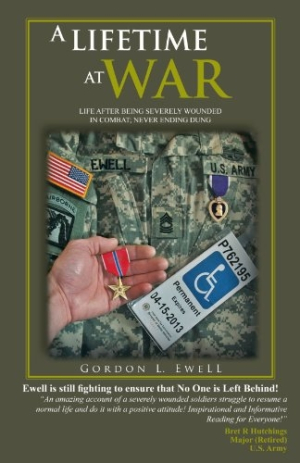A Lifetime at War
Life after Being Severely Wounded in Combat; Never Ending Dung
Trying to digest the extent and implications of Gordon L. Ewell’s injuries is nearly impossible. A career soldier, the master sergeant was severely wounded in an IED explosion in Iraq. After fifty-nine missions, it was the sixth such explosion he had experienced, and his list of resulting physical traumas is a full paragraph long.
In an earlier war, Ewell might not have survived to tell his tale. Readers today are fortunate that he did, for as gruesome as his injuries and permanent disabilities may be, he offers hope and compassion to others facing long-term recoveries. A Lifetime at War is not a poor-me tale of complaint, but rather an extremely honest account of a horrendous struggle. Ewell’s story is deeply inspirational and informative, and one that any person concerned with the fate of America’s injured and disabled veterans should read.
Ewell is neither perpetually cheerful nor prone to sugarcoat anything. “It just plain sucks!” he often says. Suffering the residual effects of a traumatic brain injury, he knows that his disabilities are permanent yet he continues to face his issues head-on, often even with a bit of humor. “My brain and my left leg are not always on speaking terms,” he comments, and, “my brain chose, among other things, to divorce my bladder. They no longer communicate.” He credits his military training for his “ability to adapt and overcome in any environment,” and compares the long road to recovery to a war zone, its evolving missions changing at any moment. The soldier in him comes through, and other veterans will relate: “You do what you have to do; you sacrifice and endure.” As Ewell sees it, a disabling injury may end the fighting in one war, but it starts a new war of its own.
Ewell’s writing style is direct, if somewhat repetitive and reliant on cliched language. He speaks of inevitable depression and facing demons, never implying that they can be avoided, and discusses the impact of traumatic injury on loved ones and friends, acknowledging that they will also suffer. He discusses Post Traumatic Stress Disorder, suicidal thoughts, and more, exhibiting a keen familiarity, and offers guidance and information about places to go for help. Ewall deals with his own PTSD by writing poetry and includes a selection of his poems as well. No topic is off limits, and what he has to say is exactly what others in his position—and their loved ones—need and perhaps want to hear.
Making a new life after any traumatic event is inevitably difficult. Ewell’s day-to-day experience is a continuing fight, one that he knows will end only upon his death. But he is a survivor and a soldier to the end. Just as he advises others to push onward, to set missions and find purpose in their lives, so, too, must he find ways to be all that he now can be. He has set a goal of helping his fellow veterans, and A Lifetime at War is part of his effort to meet that challenge. “We are a team,” he reminds them, “We look out for each other.” Above all, “We leave no one behind.” Ewell’s efforts are certain to be appreciated.
Reviewed by
Cheryl Hibbard
Disclosure: This article is not an endorsement, but a review. The publisher of this book provided free copies of the book and paid a small fee to have their book reviewed by a professional reviewer. Foreword Reviews and Clarion Reviews make no guarantee that the publisher will receive a positive review. Foreword Magazine, Inc. is disclosing this in accordance with the Federal Trade Commission’s 16 CFR, Part 255.

